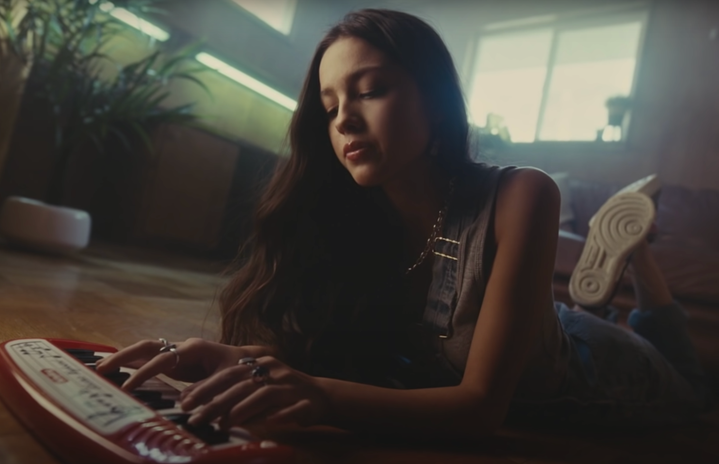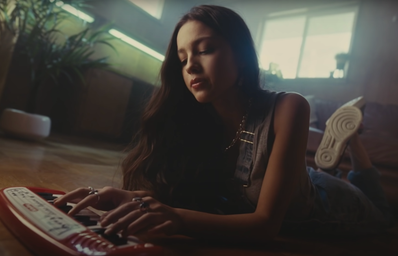It’s the same tired bullshit, over and over again.
Girl is sad. Girl writes about her feelings. Girl is praised for being “brave” and “vulnerable.” Girl’s music blows up. Girl is suddenly deemed overrated. Girl is suddenly pitted against another girl, while the rest of the pop-conscious society throws popcorns into the flame.
Aren’t yall tired?
So in case you’ve been living under a rock this past year, here’s a recap of the latest “drama” in the pop music scene.
On January 8, 2021, Disney+ star Olivia Rodrigo released her breakout debut single “Driver’s License.” It was met immediately with widespread critical and commercial acclaim, breaking the Spotify record for the most streams in one day for a non-holiday song and reaching number one on the Billboard Global charts. It’s not hard to see the appeal; the four-minute song is a relatable, powerful ballad about a young girl’s first heartbreak—a universal human experience. The music video, which has since amassed 196 million views, pictures Rodrigo driving through the suburbs as she struggles to move on from an ex.
Since its release, “Driver’s License” has enjoyed much love from its listeners, particularly from TikTok users. However, it is not without its controversy. In fact, part of the song’s popularity may be attributed to the alleged feud between Rodrigo and Disney alumnus Sabrina Carpenter, the rumored current girlfriend of Joshua Bassett—Rodrigo’s co-star in High School Musical: The Musical: The Series (yes, it’s a mouthful) and the rumored ex she sings about. For context, Rodrigo’s song mentioned that her ex is probably with a “blonde girl” much older than her who embodies everything she is insecure about—a description that fits Carpenter.
It also doesn’t help that Carpenter’s supposed response single, “Skin,” seems to address Rodrigo in its opening lines: “Maybe we could’ve been friends / If I met you in another life / Maybe then we could pretend / There’s no gravity in the words we write / Maybe you didn’t mean it / Maybe blonde was the only rhyme.” The song, which supposedly addresses both Rodrigo and her haters, leaves a message: “Don’t drive yourself insane.”
The media, of course, ate this up. In just a matter of days, everyone was taking sides. Many interviews of Rodrigo and Carpenter have involved questions regarding the controversy. Hosts, especially male ones like Zach Sang and James Corden, have accused Carpenter of “skirting around the controversy.” Rodrigo has also been similarly criticized for deflecting questions and painted out to be an “obsessive ex-girlfriend” and a “one-hit wonder.”
But really, what are these women supposed to say? If they were to confirm that yes, all these stories are true, they’d be attacked. If they were to stay quiet, they’d also be attacked. There’s nothing right to do in these situations, because people will take their words out of context regardless.
We claim to be a progressive society, one that upholds the notion of “girls supporting girls.” And yet, the media is eager as ever to reinforce the stereotype of catty female pop stars who are always feuding against each other, usually over a dude. We have seen this before with Miley Cyrus and Selena Gomez, as well as Taylor Swift and Katy Perry. We love hyperfocusing on the lives of these young female pop stars, and in the process, completely underplay the nuances of their songwriting—testaments to their respective talents.
Haters have called Rodrigo “insecure,” but she is self-aware of her own insecurities. In “Driver’s License,” the singer-actress compares herself to the “blonde girl,” the archetypal All-American girl. It’s not lost on us that Rodrigo is Filipino-American. Many BIPOC girls, myself included, know what it’s like to grow up wanting to be paler, to be blonder, to be blue-eyed. Perhaps, this is why the song resonates so strongly with many of us. Rodrigo’s success in the pop industry, which has been dominated by white singers for so long, also signifies a long-awaited progression.
If there’s anything “Driver’s License” and “Skin” have in common, it’s women taking agency of their own narratives. “Driver’s License” literally puts Rodrigo on the driver’s seat, as she sings openly about her experience. You can hear the pain in her voice as she recalls memories of her relationship in the highlight bridge: “Red lights, stop signs / I still see your face in the white cars, front yards / Can’t drive past the places we used to go to / ‘Cause I still fuckin’ love you, babe.” Similarly, Carpenter reclaims her story in “Skin”: “But you been telling your side / So I’ll be telling mine, oh.” Furthermore, the music video for “Skin” shows Carpenter and her lover unbothered, even when the world is crashing down around them, embodying the lyrics “I wish you knew that even you / Can’t get under my skin / If I don’t let you in.”
Why is it that female pop stars have to exist in the extremes? Why are they put on impossible pedestals by the same society who would also parade in their downfalls? We claim to be a “woke” society, and yet we are keen as ever when it comes to tearing down women or pitting them against each other.
In case you forgot, music is an expressive medium, and is inherently personal. Why do we expect female singers like Olivia Rodrigo and her predecessor, Taylor Swift, to censor their own feelings? Why do we vilify them for singing about their exes, when hardly anyone gives a damn when Drake or John Mayer does the same? Rodrigo is literally an 18-year-old, what else is she supposed to write about if not her feelings? She is insecure, yes, but aren’t all teenagers? Aren’t all of us?
Female pop stars deserve to write about their personal experiences without being labelled as insecure, pitted against one another, or have their successes invalidated as “publicity stunts.” Women face enough struggles in real life, and music should be a place where we are allowed to vent and express both our frustrations and joy. Taking agency of one’s own narrative is just as feminist and empowering as the colorful, upbeat “girl power” songs that flooded the industry just a few years ago.
It’s easy to forget that pop culture in recent decades have been largely shaped by iconic female stars like Britney Spears, Beyoncé, Taylor Swift and Nicki Minaj. Olivia Rodrigo and Sabrina Carpenter simply represent the new wave. It’s time we give them credit where it’s due, and break this cycle of negativity.

